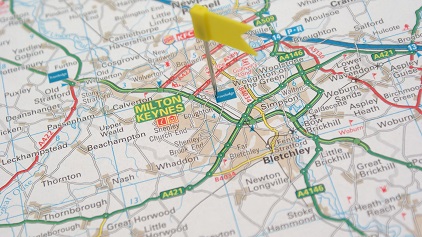 Milton Keynes’ Economy, Business Innovation, Jobs and Skills, Industry and Infrastructure
Milton Keynes’ Economy, Business Innovation, Jobs and Skills, Industry and Infrastructure
Since 2003, Milton Keynes has risen as the fastest growing city in the UK in terms of population and creation of new jobs. Research shows that the number of businesses increased by over 18% over the decade from 2004 to 2013, leading to the creation of 24,400 more jobs. Milton Keynes demonstrates the highest job growth among the cities of the south, and the highest population growth among 64 UK cities.
The following key statistics determine Milton Keynes’ economic success:
Economy & Business Innovation
Milton Keynes ranks second in Business Startups (behind London) with 67.66 per 10,000 people. Gross Value Added (GVA) per worker, the value of goods and services produced per capita, places Milton Keynes fourth among 63 cities, indicating a high contribution of the workforce to the UK GDP. Finally, Milton Keynes is tenth out of 64 UK cities in the registration of new patents, a strong indication of innovation.Â
Jobs and Skills
After London, Milton Keynes is strongly preferred by high-skilled workforce for employment. 35.65% of working age population hold a degree, whereas only 7.32% of the working age population have no formal education, indicating that the city not only attracts, but also maintains educated workforce. On a percentage basis, Milton Keynes saw the largest net increase in jobs by 18.2%, followed by London, Cambridge and Brighton. In Private Sector Jobs, the city experienced 7.2% growth on a year-to-year basis between 2012-2013, with 124,600 private sector jobs in 2013, and a overall Employment Rate of 73.6% for 2014.
Infrastructure
It is estimated that 255,700 people currently live in Milton Keynes with 65.9% of them aged between 16 and 64 years old. Forecasts estimate that the population will grow by 12%, an additional 29,450 people, by 2020. The city council has developed a set of key strategies with the aim of transforming Milton Keynes into an engaging marketplace and investment hub. The city’s fast growing population sets the grounds for the development of transport infrastructure, public services, commercial and office buildings and community development alongside a digital infrastructure to support the relevant policies.
In conclusion, Milton Keynes follows London at a steady pace. Although significantly smaller, Milton Keynes demonstrates signs of economic growth, mostly as a result of its growing population. The city offers many job opportunities and manages to attract and retain more people than what larger cities do, indicating a diverging economic performance.
Resources:
http://www.milton-keynes.gov.uk/planning-and-building/growing-mk/key-strategies
http://www.theguardian.com/cities/datablog/2015/jan/19/uk-cities-ranked-jobs-migration-house-prices-broadband-speeds-data
http://www.milton-keynes.gov.uk/your-council-and-elections/statistics/population-statistics

